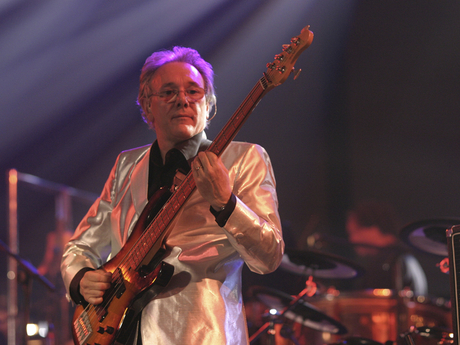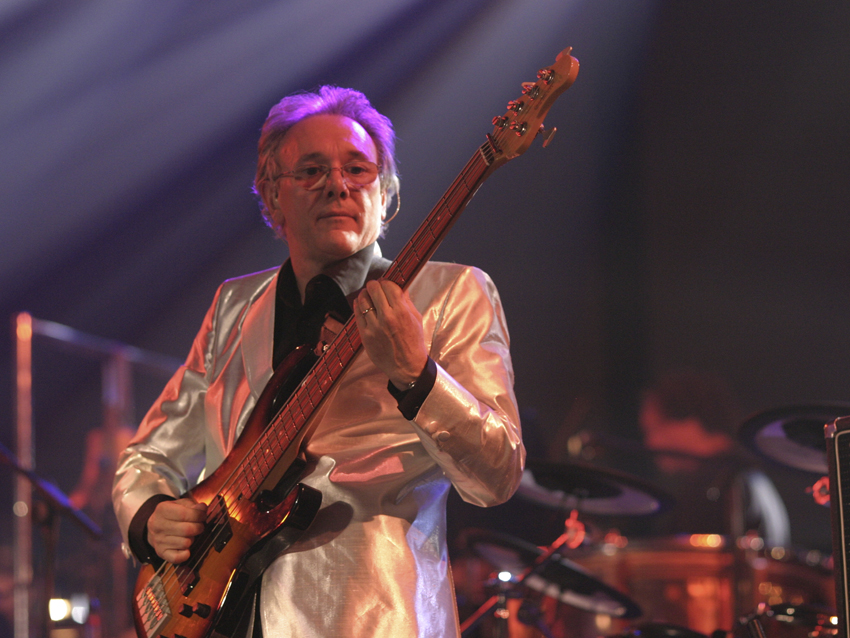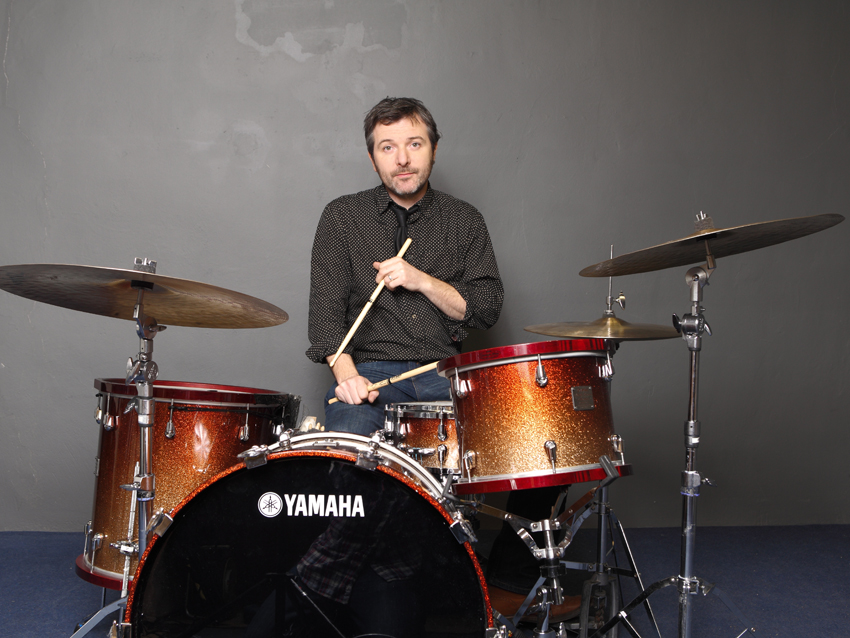Trevor Horn and Ash Soan: how to be a session drummer
The legendary producer and the studio ace on making a career as a pro player

Want all the hottest music and gear news, reviews, deals, features and more, direct to your inbox? Sign up here.
You are now subscribed
Your newsletter sign-up was successful

Trevor Horn on stage with The Buggles in 2004, © Toby Jacobs/Lebrecht Music & Arts/Corbis
Session work is becoming an increasingly more visible area of the drum industry attracting many young players towards studio careers over the rock star dream, but with dwindling budgets and technology advancements eschewing the need for real musicians in many situations it's a hard-fought battle to secure the few session gigs that exist.
With hard work, the right attitude and a few grains of luck, the session world can be extremely fulfilling, particularly at the dizzying heights of someone like Brit groove merchant Ash Soan.
Almost 20 years into his career, Ash recently contributed tracks to Adele's award-winning smash 21 (Set Fire to The Rain), Cee-Lo Green's The Lady Killer (I Want You) and Robbie Williams' Reality Killed The Video Star (Morning Sun), amongst plenty of others.
The latter he recorded with producer Trevor Horn, a man of exceptional and innumerable talents himself. A brief glimpse at his discography reveals a startling number of writer, performance and production accolades for iconic tracks released in the last 30 years. If sessions are your dream, this is the man to aspire to work with.
Ash spends plenty of time in the studio with Trevor between West London's Sarm and Trevor's LA recording studio. Most recently they have collaborated - along with similarly well-credited musical luminaries Lol Creme and Steve Lipson - for a stunning new band, Producers, whose new album Made In Basing Street combines Ash's playful side and deep pocket with Trevor's exceptional vocal talents, bass guitar prowess and lush, wholesome production.
At a recent (and rare) Producers gig at Bush Hall, London (and in association with Tech Music Schools), Rhythm picked the brains of Ash and Trevor to find out exactly what a seasoned hit producer looks for in a drummer and what studio work is really about.
Want all the hottest music and gear news, reviews, deals, features and more, direct to your inbox? Sign up here.
Trevor, what is it about Ash that makes him a desirable drummer to work with, and what particular assets do you look for in a studio drummer?
Trevor Horn: "Lots of good jokes! He plays in time effortlessly. I hear lots of drummers and I've played with lots of drummers but, for instance, the song 'slave to the rhythm', Ash is the only person over here [in the UK] that I've heard who can play that beat, as well as be able to play rock pretty effortlessly.
"You're always looking for people who can go to 11, just something more than your average. I'm not a big fan of virtuoso jazz-rock drummers. Ash has a really good combination of talents. He's a virtuoso drummer without being a virtuoso drummer, who plays in time and is good to play with. Some people try and make it into an obstacle course and hide the beat or hide beat '1'. It's much easier if you don't do any of that!
"Some drummers don't seem to have a clue about the song, they play the wrong thing and are all over the place because they're not listening to the singer or how the song moves. To be a really good drummer you've got to be listening to the singer and you've got to make sure that what you do helps them rather than hinders them."
Ash, how does working with Trevor differ to other producers you work with?
Ash Soan: "There are some newer producers on the scene, and I have quite a cross-section of people I work with, but Trevor's the most interesting. Trevor seems to come back to songs and look at them and hear them as an overview whereas other people will concentrate on sounds. Trevor seems to look at the song, and I hope that's what I do too."
Trevor, do you think about drum parts or sounds before a session or do you leave that to the drummer?
TH: "When I get a song I'll get together a bunch of the best people and see what I can do with it. I'll have an idea of something better than the demo I've heard and may have an idea of whether it's going to be a live drum thing, or the drums should be dead, ambient, those sorts of things, but I won't get into detail.
"I would get involved if I didn't like the sound, but the sound always gets better when you play the right thing. We don't spend hours."
AS: "We get a pretty instantly good sound at Sarm."

To what degree do you call on Ash for sessions because of his ability to achieve a good drum sound?
AS: "It's probably more of a playing thing."
TH: "The bigger the kit you have the worse it will sound."
AS: "That's why I use the most basic kit possible. When I did those clinics last year and said I only used two cymbals somebody saw me play and emailed me and said, 'you weren't lying!' the more stuff that's there..."
TH: "...it clutters and spoils the sound. Especially those big tom toms. Unless you're Billy Cobham. I always used to enjoy his playing. The great days of jazz rock drummers..."
AS: "But he wouldn't sound great on a Ronan Keating record."
A lot of drummers arrive for sessions with a huge arsenal of gear to cover all bases. Is that necessary?
AS: "We have a bunch of snare drums from Yamaha at Sarm but really there's only a couple that we switch between."
TH: "You hire an American session drummer and the cartage bill is more than you pay people over here for a day's work. You can have whatever kit you want but that's a bit daunting. Too many choices for me."
AS: "That's why I use the small kit. You're limited in a way, but that limitation means hopefully you're going to deliver something tidier.
"I've always liked the drummers who make a little kit sound like there's a lot of things going on. ?uestlove just has a floor, kick, snare, hats and a ride and off he goes."
Technology advancements mean drum sounds and programmed parts can be achieved quickly, so what's the value of a drummer in the modern age?
TH: "I didn't like drums in the '70s, early '80s. I was always fighting the drummer because I wanted him to play stuff he didn't want to play. They wanted to play jazz or whatever and I wanted four on the floor. And they'd get shirty with me, so I didn't like them.
"When drum machines came out I was really happy and made a lot of records with drums machines. I didn't think there were many good drummers in the '80s apart from Stewart Copeland. He was brilliant, and Cozy Powell.
"At the end of the '80s when everybody started to program stuff on computers I got bored of that and started going back to drums, but it took me a while."
AS: "There's more dynamic range with drums. Every hit is different."
TH: "There's always something happening. The problem with drum machines is that if anything's going to happen you've got to make it happen yourself and it's hard work. The method I've used a lot is to get a small band to play a song and use all the ideas that the people had and make the record from that, reprogramming bits.
"It's much easier with a group of guys to say, 'Let's try it in this key and that tempo.'"
That way you'll be open to more happy accidents too?
TH: "When we first recorded 'Video Killed The Radio Star' I never heard that piano line behind my voice until we hit the studio. Geoff [Downes, Buggles keyboardist] came up with that on the day and I remember being knocked out by it. If I'd been playing all the instruments on my own record I never would have heard that."
AS: "I remember one of the Robbie tracks we worked on. It was pretty much finished and at the end I started playing around a bit, then Trevor said, 'you know that bit you did at the end, we've moved it into the bulk of the song.'"
TH: "He basically thought we were finished so he just filled all the way. It was spot on in time so I used it just behind one of the choruses and it brought it to life."
AS: "When you get more than one musician together people can spark off each other and you can't program that."
TH: "It's a very nice thing when it happens. When you're with other people who are musicians, somebody might show you something and you learn things. That's why a computer seems like a pretty cold thing. But it all ends up in there anyway!"
What is some of the best advice Trevor has imparted to you, Ash?
AS: "The song. Out of all the producers I worked with he's looking at and hearing all of it. That's what I've tried to do and I think that's why he likes me. It's re-affirmed that that's the right way to do it. Try and think of the song, don't think about the drumming, actually.
"I'm sure some of your readers might say, 'what's he on about, that's all we're interested in,' but if you really want to carve a career in playing music you've got to think about the music and not just the inner workings of what we do. Think of it as a whole. I've realised that's what he likes about me.
"If you want to be a Thomas Lang and you're driven to that, absolutely do it, but if you want to be a session guy think about the song."
Was there a moment when the penny dropped?
AS: "My first band Del Amitri, I'd come out of college and joined them two years later. I had to copy the parts of Chris Sharrock on that album Twisted. The singer made me do a fill in a different place and I really didn't like it.
"I started to realise I don't need to do that fill there, I'm only doing it because I'm thinking in a drummy way, I'm not thinking about the whole performance that I'm supposed to be enhancing, dynamically. Don't go to the ride because you're bored of the hi-hats, go to the ride because there's something happening musically.
"Go and listen to the great song drummers. I picked up on it pretty early on. There's something about Ringo, Gadd, those guys. Gadd's a good example. Everything he plays is about the song. Even amazing songs like 'Chuck E's in Love'. It's an incredible Gadd lick, but if you think about the song - it stops, there's this beautiful pause then Gadd plays this beautiful thing to get back in. It's a complete hook and it totally makes sense. It's not ego-driven, it's just a beautiful thing."
How hands-on is Trevor?
AS: "I turned up to do a session and he was in the control room when we played the song, then he disappeared and left me in there with the engineer. I said to the engineer, 'is everything okay?' he said, 'yes, he trusts you.' Then he came back down, had a bit of a listen, made some suggestions, then off he went again. That was quite a nice moment as I thought I was getting fired when it was the opposite."
Does he give specific direction about your parts?
AS: "He might say it needs to get more exciting there, or don't fill here."
How do you interpret things like that?
AS: "Lift the energy, maybe start branching out and do a couple of fills to make it feel more exciting, or it needs to move a little more in energy. There's obvious things too like closed hats then go to the ride. It's about communication. You've got to understand what people want and try to deliver it, and remain inspired to deliver it."
Do you ever suffer creative block?
AS: "Thankfully it doesn't happen that often. If it does and it's a certain song I might take time out to listen to something else that's similar and see if I hear something in that that could work. Reference something."
Trevor, who are some of your favourite drummers you've worked with?
TH: "Obviously Ash, Alan White - I love him - Stewart Copeland. I played with him a few times, he's pretty hard to play with. He's wild but it's exciting. You've got to play as well as Sting to play with Stewart. The American guys too, John Robinson, Abe Laboriel, Curt Bisquera."
Any other tips for our readers?
AS: "Definitely work on technique. There's a means to an end with technique, you've got to be able to do it. Trevor will ask me to do a particular thing and I've got to be able to do it. But certainly in the last 10 years I've been concentrating more on the music bit of it."
Record labels are suffering from dwindling budgets these days. Even recording at this level, is there pressure to get things done quickly?
AS: "When I was out in LA with Trevor recently I did four tracks. One was for Seal. They had a programmed beat that I played along to. I did one take and they said it was pretty good. I did two more takes and Trevor said, 'Let's move on.' I wanted to do a couple more but within those three takes he'd obviously heard enough to make it happen.
"He might not take all that stuff but there are certainly a couple of fills at the end they might use. I'm very fortunate that he keeps calling me back."